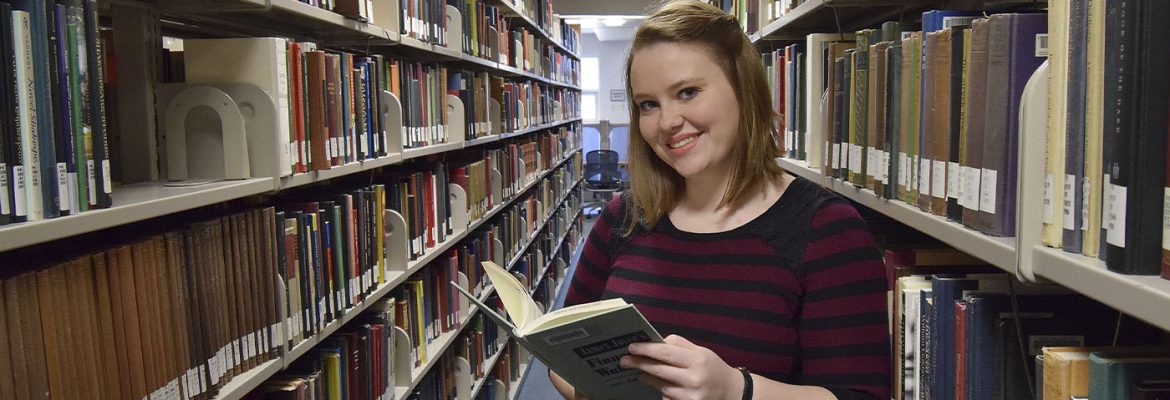The USM English major is devoted to the study of language, literature, and culture. Focusing upon the British and American literary traditions, the major exposes students to a range of literature in different historical eras. The major encourages both the analysis of literary form and the study of literature in its historical and cultural contexts. Students learn how to read in the light of contemporary critical theories and in relation to the tools, texts, and theories of other academic disciplines. Many classes provide opportunities for the study of non-literary cultural texts and practices such as film, television, fashion, and ritual. The English major teaches students how to see the world from multiple perspectives and exposes them to a large array of content that comes from both within and outside of a university setting. The most distinctive skill the major develops is critical expository writing. Virtually every course requires substantial writing from students, ranging from a weekly short paper to longer research papers.
The English Department at USM is known for its academic rigor and popular instructors. In addition to our diverse selection of classes, our students can also take advantage of several yearly events. In October the O’Brien Poet is in residence for several days to meet with students and to give a public reading. Past recipients of this prestigious prize include Ada Limón, Paul Muldoon, Terrance Hayes, Jorie Graham, Li-Young Lee, Frank Bidart, and Charles Simic, among others. In the summer, students can take part in the readings and activities of the Stonecoast Writers’ Conference and the highly-ranked Stonecoast MFA program. During the regular school year, we offer a lecture series that features scholars and writers from within the Department and without. We were recently pleased to host the eminent scholar of Modernist Studies, Marjorie Perloff.
Students are encouraged to go abroad for a semester or a year and to consider an internship in professional writing with a local publication or organization. Recent internships have placed students with some of Maine’s best cultural resources such as The Telling Room, Alice James Books, and the Maine Writers and Publishers Alliance.
The Department offers its own merit and need-based scholarships and English Majors have competed successfully for other scholarships within the College of Arts, Humanities, and Social Sciences. Recent graduates have gone on to graduate programs in English at the University of Washington, Seattle, and Lehigh University; in Creative Writing at the University of Virginia, the University of Arizona, and Columbia University; in film studies at Columbia University; and in Music Composition at Wesleyan University. Recent alums have also established careers outside of academe, whether it is teaching at public and private schools, writing about sports for the Bleacher Report, or publishing books on a wide variety of topics.
Our Faculty
Recent and current full-time faculty in English include some of the most decorated scholars in the University of Maine System, including two Distinguished Professor and two Trustee Professors. Faculty have been awarded grants from the Fulbright program; the National Endowment for the Humanities; the Lannan Foundation; the Weimar Stiftung; the Mellon Fellows program; the American Council of Learned Societies; and the Maine Humanities Council. The faculty have won numerous internal grants and awards by distinguishing themselves in scholarship, teaching, and service. Taken together, the faculty have published forty books and 330 articles. They have presented a combined total of 500 presentations at national and international conferences and venues.
In addition to being productive and well-respected in their fields, they are also known for their leadership on campus. The Department boasts two interim Deans of the College and two associate deans of two difference colleges; three former directors of the Program in Women and Gender Studies, including the founder of the program. Faculty have also taken on leadership roles in the digital humanities and in a wide-array of scholarly and service-oriented activities including chairing the Faculty Senate.
Our part-time instructors are equally dedicated and distinguished in a number of areas. They have won a Pushcart Prize; the Vassar Miller Prize in poetry; Fulbrights; grants from the National Endowment for the Arts; and the American Council of Learned Societies. Betsy Sholl, who taught with us for many years, was made the Poet Laureate of Maine. Part-time faculty have taught previously not only at USM but also at MIT, Bryn Mawr, Tulane, Bates, Colby, Boston University, and Simmons College. They have also held a number of other kinds of jobs—from writing screenplays in Los Angeles to teaching Latin and other languages in local schools. As a faculty, they have published seven books and thirty articles, chapters, or excerpts in a wide-variety of well-respected journals.
We hope that you will find a place in the Department of English at USM. We are interested in how thought becomes language; how creativity and analysis are related; how works of literature are understood; how texts can be defined in a variety of media. We are here to challenge you, amuse you, and to make you the best thinker, communicator, and researcher you can be. The lessons you learn in English will serve you for a lifetime. Please consider beginning that journey now.


Learning Outcomes
Every major will:
- produce a substantial body of analytical writing that uses evidence and employs formal standard written English to make a focused argument.
- read a range of complex cultural texts and exhibit a knowledge of different genres and literary history.
- use advanced research tools and knowledge of basic literary terms to compile, evaluate, and document appropriate primary and secondary sources for a substantial capstone project.
- critically examine and synthesize multiple, complex, often contradictory arguments and perspectives.
- demonstrate knowledge and comprehension of texts and traditions of language and literature written in English as well as their social, cultural, theoretical and historical contexts.


